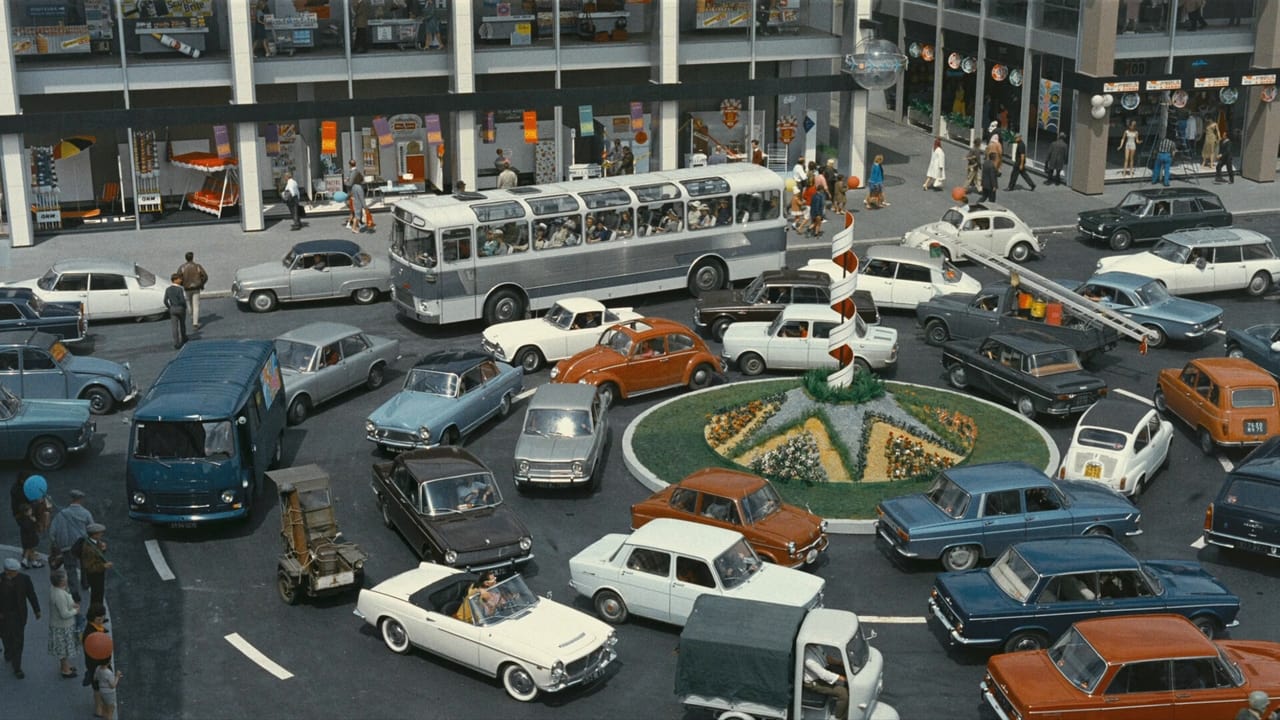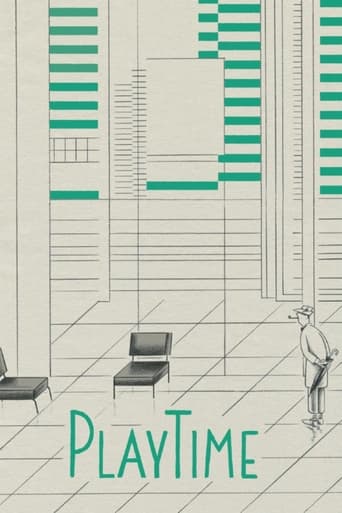InformationRap
This is one of the few movies I've ever seen where the whole audience broke into spontaneous, loud applause a third of the way in.
Mischa Redfern
I didn’t really have many expectations going into the movie (good or bad), but I actually really enjoyed it. I really liked the characters and the banter between them.
Sameer Callahan
It really made me laugh, but for some moments I was tearing up because I could relate so much.
Jemima
It's a movie as timely as it is provocative and amazingly, for much of its running time, it is weirdly funny.
Cor Lumme
Playtime features impressive sets, skillful photography, and very little else. We're given no characters to understand or relate to; a number of people appear repeatedly, but they are barely even ciphers and none of them actually qualify as "characters". There is a string of shallow, exceedingly dull events, but certainly no plot. The imagery is neat but never stirs the emotions or feelings. There are chaotic scenes with lots of activity, but even these feel drab and tedious. The film is not sad, or grim, or wistful, or cynical; it is utterly without meaning, a tale told by an idiot, full of sound and fury, signifying nothing.If it were a purely experimental film (i.e. just shots of cityscape with no pretense of plot, or perhaps something surreal and obviously nonsensical), this film's shortcomings would be understandable and justified. But Playtime keeps making awkward stabs at forming a plot and presenting jokes, tricking you into believing that it is a cohesive narrative with a point, or at least a simple comedy. The film is neither of these things, and so it ultimately feels like a mean- spirited joke on the gullible viewer.But that's not my biggest problem with the film. My biggest prob is this: Playtime simply DIDN'T NEED to be a motion picture. It would have served its purpose just fine (perhaps better!) if it were just a book of still photographs. There is no adequate justification for making it a moving film.This film could have been really stirring and meaningful if Tati had remembered to give it a point. A much more satisfying artistic film like "Songs From the Second Floor" by Roy Andersson, for instance, appears similar on the surface: like Playtime, it has a dreary tone of alienation, a very vague story, and weary urban characters. Yet "Songs" uses its minimalist elements all very purposefully to impact the viewer in a relatable, emotionally-engaging manner. "Playtime," in contrast, doesn't even have half a film's worth of substance.As for the comedy, there is some minimal slapstick in the film, but its execution is lifeless at best and, more often, frankly terrible. It feels almost as if Tati wrote down some cute joke ideas, then decided to see exactly how dull, lame, awkward & vague he could make them without his audience losing patience and walking out of the theater. Many of the recurring "jokes" don't even qualify as jokes (for instance, a waiter keeps smoothing his hair as he walks around. har-de-har-har.) Instead, they feel like a beginners' improv club aaaalmost coming up with a funny scenario but giving up halfway through.This film may be a decent piece of history for its 1960s aesthetic. But as a viewing experience, it simply lacks anything to justify its overlong running time.
souplipton
Playtime is an intricately craft and incredibly directed comedy, with hundreds of moving parts in each scene resulting in an abundance of visual gags, often assisted by well timed sound effects. The camera keeps all the characters visible, and the deep focus ensures that we can see all of it at all times. The camera is expertly placed to frame the action in the exact way that is needed to produce the visual gags. Tati also manipulates the audio track, turning down the dialogue and turning up the effects. This guides the audience's attention to ensure that their focus is always where it needs to be in the very busy frame. However, though the film executes the gags perfectly (and should definitely be studied for how to fully utilize the medium for the sake of comedy), the gags are themselves not excessively funny. In some films this would not be the biggest issue, however, Playtime is a film built around these gags. Rarely presenting jokes in dialogue, and having the barest thread of a plot, Playtime has only its gags and its themes about modern life. The negative view of modern life and technology, arguing that they have taken the individuality out of the world, is one which has been presented in hundreds of other works, and is not enough to carry the film. Have nothing more than a banal theme and its plethora of flat (although admittedly well executed) gags, Playtime is an excellent film to study for its formal techniques, but nothing more.
brentsbag-1
Wow! I've never seen this. It's just amazing. I'm taking days to see it to savor it, just having a little each night for a simple dinner and Tennessee Whiskey.This is my favorite type of film.Does anyone know if Robert Altman and this director had any links?I feel like I'm watching Short Cuts.I want to see this in the original Cinerama Dome of Hollywood.I just don't understand the line requirement. I love this movie and will just try to send a good night, and I love you all who come to International Movie Data Based dot com.Love Brent Kliss
thisissubtitledmovies
excerpt, more at my location - Many creators have suffered for their art, but few go as far as bankruptcy to succeed. After Jacques Tati made his third feature film, Mon Oncle, in 1958, it took him nine years to wrap shooting on his next project Playtime, having had to generate funding (some of which was personal), and construct an entire metropolitan setting from scratch. Although Playtime is often very physically compact, it might be said that this is the 'epic' in Tati's filmography, if only for the sheer scale of his efforts in creating an artificial ecology of thought, and for the assured methodology behind this fascinating world.If only for the sheer magnitude of what Tati has built and voiced, Playtime is a curious beast to behold. Add to that the unique, interesting ways in which he manages to collate different representations of capitalism; the meticulous, almost real-time approach to telling his story; the rasping social context that he keenly offers, and this is an essential artefact of world cinema. It's somewhat comforting to see somebody go all-out and succeed, and although Playtime financially flopped, there's little doubt that it ranks as a gutsy, artistic triumph.

